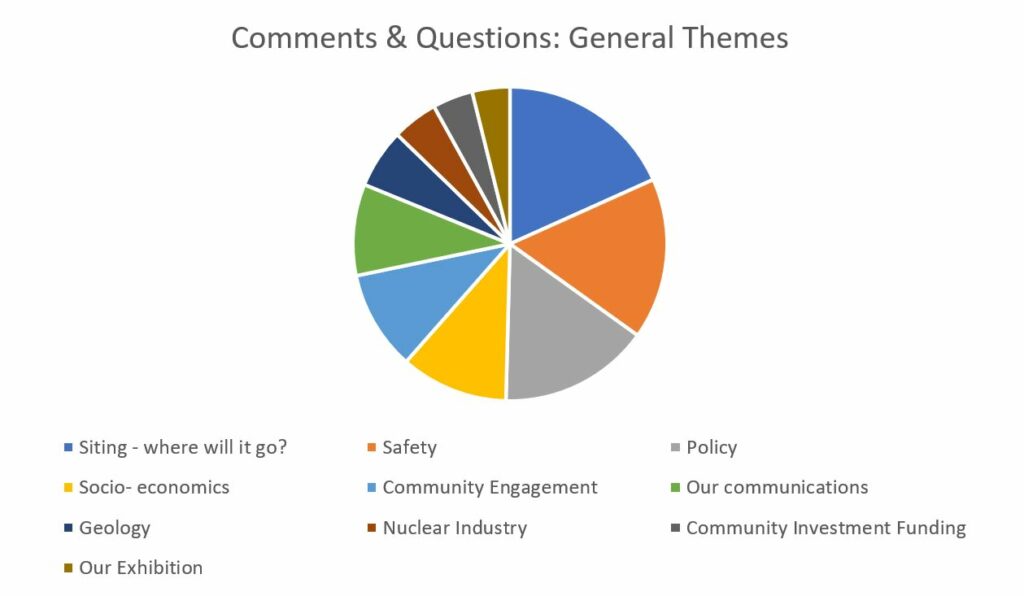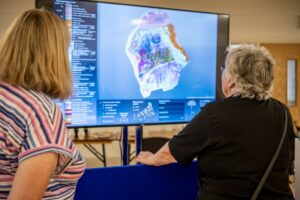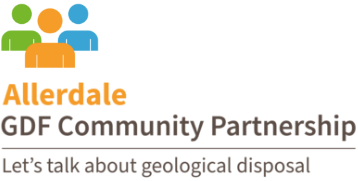SEARCH AREA ANNOUNCEMENT
Which communities are included and how did we get there?
Part of our job, as an initial Working Group, was to identify a ‘Search Area’ within which Radioactive Waste Management could look for a potentially suitable site to build a GDF. This early-stage work has now been completed and the map below outlines which communities are included.

The Search Area is approximately 230 square kilometres and includes 13 Allerdale District electoral wards. Every household within the Search Area will be receiving a letter from us to let them know and to explain what happens next and how they can share their views.
How did we identify the search area?
To identify the Search Area, we looked at information already available to help us understand which parts of Allerdale, outside of the Lake District National Park, could be included and where there were difficulties and opportunities. We carefully considered key factors using information already available in public documents, including safety and security, community requirements, the environment, engineering feasibility, existing or required transport links and value for money. We also listened to the views expressed at our online and face to face events.
When all of this information was pulled together, we were able to narrow down the whole of Allerdale to particular part of it. Radioactive Waste Management then evaluated our suggestion and concluded that the Search Area, including the area off the coast (under the seabed), does have the potential to accommodate a GDF deep underground, and the infrastructure needed on the surface.
However, this evaluation has not confirmed whether the Search Area is suitable to host a GDF – only that it has the potential. Significant additional work will need to be undertaken to confirm whether this is the case.
What happens next?
The next part of the process involves forming a Community Partnership to continue the conversation. A Community Partnership can only be formed with participation from one or both Local Authorities, and Allerdale Borough Council is yet to decide on whether to join a Community Partnership. We currently expect this decision before the end of the year.
If a Community Partnership is formed, there will be a process for identifying groups, organisations and individuals, aiming to be reflective of the community to continue this work as Community Partnership members.
At that point, Search Area communities, including yours, will benefit from £1m per year in Community Investment Funding for projects, schemes and initiatives that improve the local area or the community’s well-being. If investigations progress to the point at which Radioactive Waste Management need to drill boreholes, funding would increase to £2.5m per year.
The process of finding a site is likely to take between 15 to 20 years (but may be longer or shorter depending on how things progress locally) and other areas of England, including Copeland, are also being considered.
A task for the Community Partnership will be to ensure that any final proposal for a GDF fits the vision for the area based on your views. It’s important to remember that a GDF will only be built in Allerdale if there is a willing host community and a suitable site which can be shown to be safe. If the community doesn’t want it, it won’t be built. It’s as simple as that.
No decision has yet been made on whether a GDF will be built in Allerdale and this is only the beginning of a long conversation over many years about what’s right for the area, and how a Community Partnership could support your vision for your community.
Please get involved and let us know what information or support you need in order to take part.
Upcoming events and ways to get involved

We are still here to answer your questions and make sure you have all the information you need to take part in the conversation going forward.
We encourage you to contact us with your questions and join any of our face-to-face or online community sessions, details of which are listed below and on the ‘Get Involved’ page of our website:
- Thursday 28th October 1-2pm via Zoom (online). Register HERE
- Saturday 30th October 1-4pm at St Andrew’s Hall, Silloth. Register HERE
- Saturday 6th November 10.30am-4pm at The Carnegie Theatre, Workington. Register HERE
If you are not able to attend any of these events, please contact us directly with your comments and questions:
Call: 0300 369 0000
Email: gdfinfo-allerdale@nda.gov.uk
Write to: Allerdale GDF Working Group, GDF Enquiries, PO Box 734, Swansea, SA1 9RP
For hearing and speech impaired customers please call via Relay UK on 18001 (all calls are charged at local rate)
Your Reaction
Over the course of the last ten months, we have held 12 face-to-face drop-in sessions, three online events and countless meetings with local organisations and key stakeholders, and we are holding more events in the coming weeks.
We aim to create safe spaces for people to come and share their views with us, whether that be in their local village hall, or in a virtual ‘breakout room’ during our online events.
You have really engaged with us and been respectful of each other’s wide-ranging views, producing some good, interesting discussion and robust debate.
We have taken note of all your feedback and are building a picture of your thoughts and feelings and vision for your community.

Here are just some of the questions and topics raised, as you asked them:
“Is it really safe?”
Scientists and other authorities all over the world agree that geological disposal is the safest way to deal with ‘higher-activity’ radioactive waste (the most radioactive kind) for the long term. This international consensus comes after decades of scientific research.
The Office for Nuclear Regulation and the Environment Agency, the UK’s independent nuclear regulators, will review the designs and safety cases for a GDF, the proposed site, and the science that informs them, to make sure it protects people and the environment. A GDF will only be built if the independent regulators are satisfied and more information about the Regulators can be found in this newsletter.
“Longevity of development/jobs/prospects?”
Whether or not a GDF ends up in Allerdale or elsewhere in the country, we already know that over 3000 Allerdale residents work in or support the nuclear industry, so it’s vital that the interests of the people of Allerdale are represented in the process to determine the location for a UK GDF.
The eventual host community, once they have given their consent, and a suitable site has been found, stands to receive significant long-term investment. This investment could deliver skills and training, create sustainable long-term jobs which in turn could help to drive economic development, improve the local environment and contribute to community well-being.
“What infrastructure arrangements have been put in place to accommodate the extra population/use of roads?”
Different types of transport infrastructure will be needed at different stages of the project, if it were to proceed and the existing transport networks in Allerdale or any other site will almost certainly need to be improved, which could provide additional local benefits by improving road and rail connections and supporting tourism.
However, any plans to change the transport infrastructure would have to be in line with the Cumbria Transport Infrastructure Plan to ensure the greatest possible benefit to the local community.
“Are you really going to listen to local people who say no or is this just a smokescreen?”
When they are ready, the relevant principal local authorities (County or Borough Council) on the Community Partnership will decide when to seek the agreement of the community through an explicit Test of Public Support. This will take the form of something like a poll or referendum that lets every voter in the electoral wards which are directly affected have their say about a GDF. Without their support, the project will not go ahead.
“What impact will this facility have on house prices?”
We know that many of you are concerned about property values. Most major infrastructure projects provide compensation for local residents and property owners who experience an impact on the value of their property as a result of new infrastructures.
If this project proceeds to the next stage (Community Partnership), RWM will work in partnership with the community to assess how a property support scheme would be implemented. RWM would seek independent advice and draw upon best practice and experience from other infrastructure projects, to ensure any potential scheme is appropriate for the local area.
“Who pays for it?”
A Geological Disposal Facility (GDF) will be a major infrastructure project and a significant long-term investment for the UK, paid for by public money through UK Government. Radioactive Waste Management updates on an annual basis the estimated costs of the GDF programme and this information is made publicly available in the Nuclear Decommissioning Authority (NDA) Annual Report and Accounts.
“Where is the spoil going to go?”
Having the capacity to store and transport spoil generated during the construction of a Geological Disposal Facility in a way that is sustainable and sympathetic to the landscape character has been considered in the design principle and will be further considered during the design process once a site is identified.
The generation of spoil will be phased and minimised to ensure that as much of it as possible can be kept on site during construction, in the form of either temporary or permanent screening bunds (artificial mounds or embankments) to both screen the site from view and reduce noise emissions, which also reduces the need to transport it. Spoil is then likely to be used for land remediation projects, landscaping around the site and potentially as backfill material to help seal the facility once operations have finished.
Where spoil needs to be transported, careful consideration will be given to the route and mode of transport to minimise any potential adverse environmental effect.
“Where else is this happening?”
RWM is currently talking to multiple organisations and interested parties across England and Wales, to help people find out more about geological disposal and decide whether their community might be interested.
The fact that the first two Working Groups were in Cumbria (Allerdale and Copeland) does not mean that the GDF will necessarily be in Cumbria, and a third Working Group has now been formed in Theddlethorpe, Lincolnshire.
“Isn’t the geology of Cumbria all wrong for a GDF?”
The geology deep under Cumbria and off its inshore coast includes a variety of settings in which a GDF could be built as evidenced in published national geological data which shows potentially suitable options exist.
“How much waste are we talking about?”
It is expected that around 750,000 cubic metres of packaged waste would go into a GDF. This would be enough to fill around two thirds of Wembley Stadium. About 90% of the volume of waste planned for disposal in a GDF is from past or existing facilities. The other 10% will come from currently planned new nuclear power stations.

REGULATING RADIOACTIVE WASTE DISPOSAL
The Environment Agency and Office for Nuclear Regulation are holding the process to account

Left to right: Dr Peter Howden (Office for Nuclear Regulation) and Dr Candida Lean (Environment Agency)
Both organisations have offered support to Allerdale GDF Working Group to explain how their regulation and processes will help ensure protection of people and the environment now and in the future. Regulators can attend meetings and events, provide information about regulation of a GDF and comment on matters concerning environmental protection, safety, security and transport of radioactive materials.
The regulators aren’t members of the Allerdale GDF Working Group and are not be involved in its decision-making, or in decisions to select sites for further consideration. They do not regulate the site selection process.
Let’s hear more from the regulators who will support the Allerdale GDF Working Group, Dr Candida Lean (Environment Agency) and Dr Peter Howden (Office for Nuclear Regulation).
Environment Agency

What does the Environment Agency do?
The Environment Agency has over 10,000 staff working from offices across England. We create better places for people, wildlife and the environment. We put the climate emergency at the heart of everything we do and help society adapt to environmental challenges such as flooding, drought, sea level rise and coastal change. We improve and protect the quality of our air, land and water by tackling pollution. We work with businesses to help them comply with environmental regulations and believe a healthy and diverse environment enhances people’s lives and contributes to sustainable and resilient economic growth.
Within England we’re responsible for regulating major industry and waste, treatment of contaminated land, water quality and resources, fisheries, inland river, estuary and harbour navigations, conservation and ecology, and managing the risk of flooding from main rivers, reservoirs, estuaries and the sea.
And what’s your role regulating the nuclear industry?
The Environment Agency is the independent environmental regulator for the nuclear industry in England. We make sure that nuclear companies and the sites they operate meet high standards of environmental protection.
Operators of nuclear sites in England must have a permit for radioactive substances activities from the Environment Agency. The environmental permits we issue to nuclear site operators contain strict conditions (rules) that they must follow at all times. We set specific limits on what they are allowed to release when carrying out certain activities, including managing or disposing of radioactive waste and making discharges to air and water.
Permit conditions are designed to make sure that the operator’s activities do not harm people or the environment. The conditions will also specify that operators must use the best available techniques to minimise the amount of radioactive waste produced and radioactivity discharged. The Environment Agency carries out checks to make sure that operators do not release radioactivity above the limits set in their permit conditions.
The Environment Agency also regulates other activities that require an environmental permit. This includes activities on the nuclear site (or an associated site) that could pollute the air, water or land, increase flood risk or adversely affect land drainage.
How will your radioactive waste specialists regulate a GDF?
The Environment Agency’s Nuclear Regulation Group includes over 70 specialists with expertise in the management and disposal of radioactive waste and radioactive substances regulation, many of whom are based in our Penrith office. Dr Candida Lean, one of the EA’s Nuclear Waste Assessors, describes more about regulation of a GDF.
“The Environment Agency is responsible for making sure that the high standards we have set to protect people and the environment are met by RWM when implementing geological disposal. This includes during the design, development, construction, operation and closure stages. We will only grant an environmental permit for a GDF if it demonstrated at each stage that our high standards will met. Our regulation would begin if RWM decides there is a need for surface-based investigations such as borehole drilling.
“We’re looking forward to supporting the Allerdale GDF Working Group and the local community, and to describing how we would regulate a geological disposal facility and how our regulatory roles and processes will help ensure protection of people and the environment now and in the future.”
Office for Nuclear Regulation

The Office for Nuclear Regulation (ONR) is the independent regulator of nuclear safety and security on 36 licensed nuclear sites in Great Britain. The ONR also regulates the transport of radioactive materials and ensures the UK’s nuclear safeguarding obligations are met.
With just over 650 staff and specialists in disciplines as varied as chemical engineering to nuclear physics, the ONR is a well-respected and trusted regulator, with a proven track record of world-class nuclear regulation.
Dr Peter Howden who is one of ONR’s specialist inspectors explains more about ONR’s role in regulating a future Geological Disposal Facility (GDF):
“We do not regulate the site selection process for a future GDF, nor do we have a decision-making role in the process for identifying and selecting sites for investigation. Our regulatory role begins when a preferred site has been identified and a nuclear site licence application has been submitted.
“The site licensing process is a rigorous process and will involve a detailed examination of a whole range of different issues by our specialist inspectors.
“Our role is to protect society by ensuring the nuclear industry operates safely and securely, and we will only issue a nuclear site licence for the construction of a GDF to commence if we are satisfied the facility will be safe and secure.”
Where can I get more information about the regulators?
- A short animation about the regulators’ role https://youtu.be/HY9gcwhCDB4
- Read about the regulators’ roles in regulating a future GDF
- Environment Agency https://www.gov.uk/guidance/regulating-the-geological-disposal-of-radioactive-waste-environmental-protection
- Office for Nuclear Regulation http://www.onr.org.uk/geodisposal.htm
- Email the Environment Agency and sign up for an ebulletin: nuclear@environment-agency.gov.uk
- Email ONR: contact@onr.gov.uk
LEARN MORE

You can learn more about geological disposal on our website, where there are a range of informative and educational resources created by Radioactive Waste Management, including:
- An introduction to geological disposal
- Community Guidance – how we will work with communities in England
- Site evaluation in England
- What is radioactive waste?
- What will go into a GDF?
- Geological disposal: the multi-barrier approach
- What will a GDF look like?
There are also six, easy to follow, interactive e-learning modules to help you understand more about radioactive waste and the GDF process:

